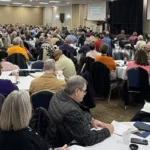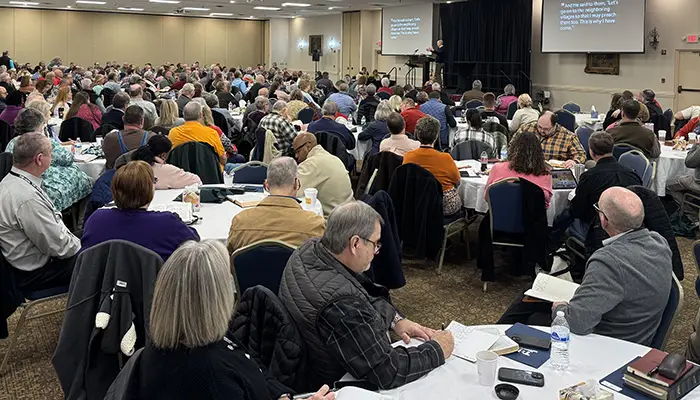One day as I was carrying out my normal routine, the memory of a past offense abruptly caught me off guard.
Out of nowhere the intruder captivated my mind in an attempt to draw my attention to the previous hurt that had once been inflicted.
As I found myself dwelling on the particular action, my emotions were reaping the consequence of such thinking.
However, before it was allowed to linger any longer, the Lord intervened. Suddenly I heard the Holy Spirit whisper to my soul, “Look at the lesson, not the offense.” I knew immediately what the Lord was steering me to remember.
We all have those moments when the Lord teaches us lessons we will never forget. This particular offense birthed such a moment.
When an offense comes, you and I will either walk into the classroom where Jesus is the teacher, or we will walk into the classroom where the enemy presides to instruct.
How do we know in which classroom we are? I am glad you asked.
The Savior’s classroom
When we walk into the classroom of our Savior, He will instruct us biblically how to handle the offense, as well as the offender.
If we stay with Jesus through it all, diving into His word and being obedient to what He instructs us to do, we will walk out of that classroom a transformed student — healed, loving the person who hurt us and in awe of the Teacher who instructed us.
The enemy’s classroom
When an offense comes, and we allow ourselves to be instructed by the enemy, we will quickly find ourselves engaging in the following:
- We will be instructed to view the offense through the eyes of the enemy.
- We will be instructed to view the person who hurt us through a lens of bitterness.
- We will be instructed against forgiveness and encouraged to hold grudges we were never meant to hold.
- We will walk out of his classroom bitter, wounded and vengeful with no peace and no solutions.
Joseph was a person whom God Himself had transformed. Joseph’s family mistreated him, sold him into slavery and lied against him.
Yet, in the end Joseph viewed the entire situation through the lens of Christ.
Instead of dwelling on the offense itself, he saw the purpose for what had happened and pointed others to do the same. He experienced reconciliation with his family. He experienced the peace of God.
“As for you, you meant evil against me, but God meant it for good in order to bring about this present result, to preserve many people alive” (Gen. 50:20).
On the day the offense resurfaced in my mind, I realized what the enemy was after, and so did the Lord. As stated previously, the enemy wanted me to dwell on the hurt, while the Lord wanted me to remember the lesson.
Whatever offense you are holding on to today, release it — as well as the offender — into the loving hands of Jesus.
Walk into His classroom, fall on bended knees and allow Him to guide you and transform your life. Refuse to allow the offense and the offender to mold you.
Instead, allow the Teacher Himself to transform you. He loves you so much.
Editor’s Note — O’Shea Lowery is a speaker, writer and podcaster. She leads Entrusted Hope Ministries and this blog post first appeared at entrustedhopeministries.org. Reprinted with permission.
Weak discipleship?
A Pew Research Center study in 2019 revealed sermons typically last 37 minutes.
When I visit churches, there are typically 25 minutes of praise music, maybe 30 seconds devoted to prayer and 40-plus minutes of preaching. Invitations are five minutes or nonexistent.
During the Jesus Movement in the mid-70s, one Sunday our pastor gave the invitation first and several came forward and got saved. Most Sundays he would speak 20 minutes, and we’d easily have a 20-minute invitation.
At that time church members were far more involved in the service with testimonies, missions reports, prayer needs and through specials by the choir, youth ensembles or soloists.
Is it because our discipling in churches is so weak pastors feel they have to do it all in one sermon a week rather than through various training opportunities?
Mark Snowden
Director of missional leadership
Cincinnati Area Baptist Association
2 reasons churches might die
A report earlier this year revealed the greatest decline in baptisms and membership in the Southern Baptist Convention in 100 years.
Thousands of SBC churches are in repose, headed for their demise.
Thousands of churches have ceased to grow and are on a numerical plateau or in a downward spiral.
There are reasons why most of these churches do not grow. Here are two primary reasons:
- The great Bible principle of intercession is abandoned.
In His sovereignty, God has chosen to limit Himself to the intercession of His people.
What God does, He does in His people, with His people and through His people.
Churches die when there is no intercession, for God does not work independently of His people.
Intercession is not merely calling the names of others in prayer.
A study of the life of Jesus reveals His intercession. Jesus cried, sighed, travailed with sorrow, grief and tears.
The truth is: To win souls we must weep over souls. We must suffer for them as Jesus did.
During His life on earth, Jesus had compassion for people and prayed with “strong crying and with tears.”
- There is a lack of understanding the Christian life.
To reach people for Christ, we must first understand the following:
- The gospel.
- How to become a Christian.
- Repentance and faith.
- Forgiveness.
- What a Christian is.
- What the Christian life is.
- How to live it.
By Sam Wolfe, evangelist
Huntsville, Ala.
The Bible says, “So be careful how you live. Don’t live like fools, but like those who are wise” (Eph. 5:15). We Christ-followers must live like Christ-followers because others are always watching.
Every one of us has influence, and we are in the process of influencing someone for the better or for worse. Sociologists tell us that even the most introverted of us will influence 10,000 people during his or her lifetime. Unbelievable!
Influence is a mystery. J.R. Miller put it well: “There have been meetings of only a moment which have left impressions for life, for eternity. No one can understand that mysterious thing we call influence, yet every one of us continually exerts influence, either to heal, to bless, to leave marks of beauty; or to wound, to hurt, to poison, to stain other lives.”
Pastor David L. Chancey
McDonough Road Baptist Church
Fayetteville, Georgia
It can be easy in times of discomfort to get stuck in the emotions of fear, doubt and anxiety.
But one of my past Sunday School leaders once put it this way: God doesn’t call the equipped — He equips the called.
When we feel uncomfortable, we can bring every aspect of the situation or decision to God in prayer.
We can find assurance in remembering He has equipped us and will continue to grant us boldness to speak and live out His word.
Let that be our prayer so when others ask, “By what power, or in what name, have you done this?” like the elders did (Acts 4:7), the first words we speak are the gospel of Jesus Christ.
Megan Harris
the-scroll.com
Speaking as an older (62) denominational servant, when churches discount older candidates due to age they are potentially missing out on a wealth of pastoral experience and wisdom.
Chuck Register
Director, mission catalysts group
Baptist State Convention of NC
“Relationships happen in small groups. Small groups function best when they are relational,” said Donna Prince, who teaches a weekly women’s Bible study at Tate Springs Baptist Church in Arlington, Texas.
“If I was ever doubtful that God still worked miracles, I was definitely proven wrong and believe completely that God is a miracle-working God,” said Rick Brown, a member of Northside Baptist Church in Jasper, Alabama.
Brown recovered from a near-fatal bout with COVID-19 and two leg amputations. “I’m here because God allowed me to live again,” he shared with The Alabama Baptist.
“I (Jesus) am the vine; you are the branches. If you remain in me and I in you, you will bear much fruit; apart from me you can do nothing.” John 15:5
From the Twitterverse
@williemclaurin
If you are called to lead … LEAD!
@nathanafinn
I am genuinely thankful for contrarians, curmudgeons, devil’s advocates and whatabouters. They aren’t always right. They aren’t always kind. They sometimes wear other folks out. But they also often help us to think more clearly, and they help keep us honest.
@PuritanMines
What you are in secret is what you really are. —John Owen
@mhenslee
Why is it that some Christians although they hear many sermons, make but slow advances in the divine life? Because they neglect their closets, and do not thoughtfully meditate on God’s word.
—C.H. Spurgeon
@macbunson
Churches today are looking for a pastor that reflects the culture rather than looking for God’s man who reflects Christ.
@shane_pruitt78
Gen Z is the least-religious-overly-entertained generation in history. So, the primary role of college pastors & student pastors is not to be entertainers or event organizers. The primary role is to be evangelists, missionaries & disciple makers.
@markwillworship
God’s church isn’t in trouble. Man’s church is. —J.C. Ryle
@brettlpitman
This morning (Oct. 23) we baptized people for the eighth week in a row! I love my church, and I love what Jesus is doing in my church!
@davideprince
Ministry will always be a battle: opposition, attacks, difficulties & persecution. But there will be a Lydia, a slave girl, a jailer, a Dionysius, a Damaris, a Jason, a Crispus & others. Jesus promises “I have many people in this city” (Acts 18:10).
@GrantEthridge
One of the strongest temptations is to forget all the good God has done for you and all the good He has for us and start lusting after the old life.










